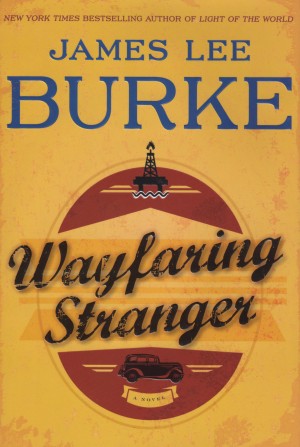
Wayfaring Stranger by James Lee Burke (2014. Simon and Schuster. ISBN 978-1-4767-1079-2.
I read Burke once before. It was so long ago, my review of his novel set in Montana, Bitterroot, isn’t archived on this blog but on Amazon.com under that title. I gave the book two stars out of five. Maybe a bit harsh, in retrospect. Maybe not. So when I saw this title and Burke’s work profiled in Poets and Writers magazine, I wasn’t immediately given to charity. I mean, Burke is a well established, flourishing icon of American letters. He doesn’t really need me to buy a book to fund his writing. But then, remembering back to my lack of enthusiasm for that earlier effort, I thought the guy deserved a second chance. So I ordered the book online (sorry Fitger’s) and, when it arrived via the mail a few days later, I placed it dutifully on my “to read” stack in my writing studio. Enough history. On to the words.
Weldon Holland’s beginnings on the dusty plains of Texas, raised by his mother and his Texas Ranger grandfather, are as colorful as a Western sunset. The running imagery of young Weldon shooting at Bonnie and Clyde’s getaway car with his grandfather’s .44 Colt as the 1932 Chevrolet Confederate roars off the Holland ranch, weaves its way through the tale, linking Weldon’s past with his future. We follow the young Texan into the Battle of the Bulge where he meets an antisemitic soldier and future business partner, Hershel Pine. Hershel seems ill suited to partner up with the educated, morally upright Weldon. But the pair find a survivor of a Nazi death camp as they stumble their way back to Allied lines, a young Spanish woman, Rosita Lowenstein, a Jew, whose appearance in the story changes Pine’s opinion of Jews, and whose beauty infatuates Holland. Back in the States, having survived combat and all its terror and deprivations, Holland and Pine go into the oil pipeline business only to find that their wartime service to their country doesn’t add up to a thimbleful of spit to the men and women who hold the reigns of power in the Lonestar state. There is much intrigue, most of it believable and well written, with a few obligatory nipples and climaxes thrown in along the way; but, for the most part, Burke’s storytelling and writing are spot on. I found myself reading the last 100 pages at 4:00am one weekday morning, compelled to complete Weldon and Rosita’s frantic journey as evil closes in, as all hope seems lost.
This is literary fiction for men. That’s the sum and substance of Burke’s writing style and, given so few men read fiction, let alone literary fiction, it’s a good thing American letters has an author as talented as James Burke to set pen to paper:
I have always believed that the American West, like Hollywood, is a magical place and the biggest stage on earth. I also believe it haunted by the spirits of Indians, outlaws, Jesuit missionaries, drovers, gunmen, conquistadors, bindle stiffs (hobos), Chinese and Irish gandy dancers (railroaders), whiskey traders, temperance leaguers, gold panners, buffalo hunters, fur trappers, prostitutes, and insane people of every stripe, maybe all of them living out their lives simultaneously in our midst.
My only real criticism is that the Bonnie and Clyde connection, including a surprise revelation about that Chevy Confederate towards the tale’s conclusion, seems a bit forced and unbelievable in the context of the larger plot. But the ending is masterful and well worth the gritty, harrowing, testosterone driven trip.
4 and 1/2 stars. Read this instead of Bitterroot!
Peace.
Mark


